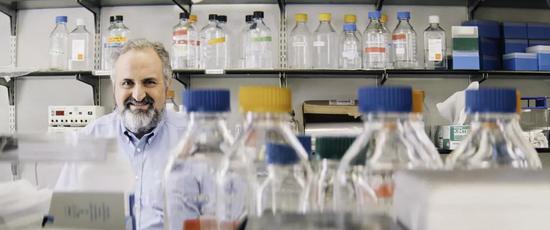To relieve immunosuppression and inhibit tumor growth, scientists have found a trick
April 25, 2019 Source: Academic Jingwei
Window._bd_share_config={ "common":{ "bdSnsKey":{ },"bdText":"","bdMini":"2","bdMiniList":false,"bdPic":"","bdStyle":" 0","bdSize":"16"},"share":{ }};with(document)0[(getElementsByTagName('head')[0]||body).appendChild(createElement('script')) .src='http://bdimg.share.baidu.com/static/api/js/share.js?v=89860593.js?cdnversion='+~(-new Date()/36e5)];Recently, a new study published in the leading academic journal Nature has provided a potential new drug regime for oncology immunotherapy. A joint team of immunologists and biochemists identified a "life gate" that regulates inhibitory activity on a class of key immunosuppressive cells. Experimental results on a variety of tumor model mice have shown that specific inhibitors targeting this regulatory factor not only slow tumor growth, but can also help eliminate tumors in combination with immunological checkpoint inhibitors.

Neutrophils are the most abundant type of white blood cells in the human body, and they usually rush into the fight against infection. However, under pathological conditions such as cancer, some neutrophils are "bad" by tumors and converted into myeloid-derived suppressor cells (MDSC), including polymorphonuclear medullary suppressor cells (PMN-MDSC). This kind of immunosuppressive cells can not only play a role in killing the enemy, but also directly inhibit the attack of the immune system, promote tumor progression and metastasis, and is one of the important reasons for the unsatisfactory prognosis of cancer patients.
Professor Dmitry Gabrilovich, an immunologist at the Wistar Institute, has focused on relieving tumor immunosuppression for many years. He and colleagues noted that the level of FATP2 expression in the fatty acid transporter family (FATP) was significantly increased in PMN-MDSC isolated from tumor model mice or tumor patients. What effect does this have on immunosuppressive cells?

As the name implies, an important role of fatty acid transporters is to help fat molecules pass through the cell membrane. Professor Paul Black of The University of Nebraska-Lincoln is very familiar with FATP2. In his early years, he discovered in yeast that FATP2 activates fatty acids and brings them into cells. The fatty acids are then metabolized or embedded in the cell membrane within the cell. "Just like there is a gate on the cell membrane that controls the entry of lipids, you can turn it down by moving it," Professor Black said. "This door plays a vital role in the metabolic system."
In the immunosuppressive cell PMN-MDSC, the researchers found that over-expressed FATP2 opened the door for more fatty acid intake, leading to accumulation of intracellular lipids, including arachidonic acid (AA). The increase of arachidonic acid and the synthesis of its downstream products play an important role in the inhibitory activity of PMN-MDSC.
In this case, if you block the door of FATP2, can you help PMN-MDSC to suppress it? When tumor cells were injected into mice that knocked out the FATP2 gene, the researchers found that tumor cells grew significantly slower than wild-type mice, suggesting that the regulation of FATP2 may have the effect of inhibiting tumor growth.
So, is there an inhibitor that specifically targets FATP2? Really!
Concetta DiRusso, a biochemistry professor who has co-authored 100,000 candidates for FATP2 in the past, and found a compound that effectively inhibits FATP2, lipofermata, which eliminates fat accumulation in cultured tissues and is small. The body of the mouse significantly reduces fat absorption.

â–²Two collaborators of the study, Professor Paul Black (left) and Professor Concetta DiRusso (Source: University of Nebraska-Lincoln)
This time, the researchers tried to inject lipofermata into tumor mice. A few weeks later, they were delighted to discover that this small molecule inhibitor can significantly slow tumor growth, and that this effect is seen in four different tumor model mice, lymphoma, lung, colon and pancreatic cancer. Got a repetition. “What’s unique about it is that it’s not just about a particular type of cancer,†Professor DiRusso said. “It’s particularly desirable to target certain cells that are ubiquitous in different cancers.â€
More notably, scientists have further tried ways to improve their efficacy: combination therapy. When the small molecule inhibitor lipofermata was used in combination with the immunological checkpoint inhibitor anti-CTLA-4 antibody, the effect of inhibiting tumor growth was achieved in 80% of lung cancer model mice.
â–²In a variety of different tumor model mice, inhibitors targeting FATP2 have a slowing effect on tumor growth, combined with immunological checkpoint inhibitors, tumor growth is inhibited (Source: References [1])
Combining these results, we hope that the scientists will find this door on immunosuppressive cells, which may open a new channel for cancer immunotherapy and provide a potential combination of multiple malignant tumors for the benefit of more patients.
Handgun Safe,Handgun Safe Box,Fingerprint Handgun Safe Box,Car Handgun Safe Box
Ningbo Zhaomu Electronic Commerce Co., Ltd. , https://www.bofonhome.com